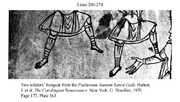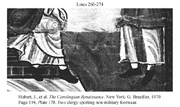Difference between revisions of "Waltharius256"
| Line 48: | Line 48: | ||
File:Waltharius-Lines-260-274-2.png | File:Waltharius-Lines-260-274-2.png | ||
File:Waltharius-Lines-260-274-3.png | File:Waltharius-Lines-260-274-3.png | ||
| − | File:Waltharius-Lines-260- | + | File:Waltharius-Lines-260-274-and-passim.png |
File:Waltharius-Lines-260-274-and-passim_1.png | File:Waltharius-Lines-260-274-and-passim_1.png | ||
File:Waltharius-Lines-260-274-and-passim_2.png | File:Waltharius-Lines-260-274-and-passim_2.png | ||
Revision as of 01:00, 27 August 2009
Walther reveals to Hildegund his plans for escaping with Attila’s treasure (256–286)
| Addidit has imo virguncula corde loquelas: | Virguncula: the diminutive seems to be used merely metri causa.
|
Aeineid 5.842: funditque has ore loquelas. ‘He pours these accents from his lips.’
|
DSSDDS | |||
| Vestrum velle meum, solis his aestuo rebus. | Velle equiv. to voluntas, cf. Persius 5.53.
|
SDSSDS | ||||
| Praecipiat dominus, seu prospera sive sinistra | DDSDDS | |||||
| Eius amore pati toto sum pectore praesto.' | Aeineid 7.356: animus toto percepit pectore flammam. ‘And her soul has not yet caught the flame throughout her breast.’
|
DDSSDS | ||||
| Waltharius tandem sic virginis inquit in aurem: | 260 | Aeneid 5.547: fidam sic fatur ad aurem. ‘Thus he speaks into his faithful ear.’
|
|
DSSDDS | ||
| Publica custodem rebus te nempe potestas | DSSSDS | |||||
| Fecerat, idcirco memor haec mea verba notato: | Ovid, Metamorphoses 14.813: nam memoro memori animo pia verba notavi. ‘For I treasured up thy gracious words in retentive mind, and now recall them to thee.’
|
DSDDDS | ||||
| Primis galeam regis tunicamque, trilicem | Aeneid 3.467: loricam consertam hamis auroque trilicem. ‘A breatplate triple-woven with hooks of gold.’ 5.259: levibus huic hamis consertam auroque trilicem. ‘A coat of mail, linked with polished hooks of triple gold.’ 7.639-640.: clipeumque auroque trilicem/ loricam induitur. ‘He dons his shield and coat of mail, triple-linked with gold.’
|
SDSDDS | ||||
| Assero loricam fabrorum insigne ferentem, | Assero: “I mean” (specifying the tunica as the lorica)
|
DSSSDS Elision: fabrorum insigne |
||||
| Diripe, bina dehinc mediocria scrinia tolle. | 265 | DDDDDS | ||||
| His armillarum tantum da Pannonicarum, | Armillarum: “arm-rings” of gold or silver, such as were worn by Germanic warriors. Here they are a valuable treasure with an important role in the plot.
|
SSSSDS | ||||
| Donec vix unum releves ad pectoris imum. | SSDSDS | |||||
| de quater binum mihi fac de more coturnum, | Quater binum…coturnum: i.e., “four pairs of shoes.”
|
Aeneid 1.318: de more. . . ‘According to custom. . .’
|
DSDSDS | |||
| Tantundemque tibi patrans imponito vasis: | Patrans: perfect in meaning Vasis equiv. to scriniis
|
SDSSDS | ||||
| Sic fors ad summum complentur scrinia labrum. | 270 | SSSSDS | ||||
| super a fabris hamos clam posce retortos: | DSSSDS | |||||
| Nostra viatica sint pisces simul atque volucres, | DDSDDS | |||||
| Ipse ego piscator, sed et auceps esse coartor. | Coartor equiv. to cogar
|
DSDSDS Elision: ipse ego |
||||
| Haec intra ebdomadam caute per singula comple. | Ebdomadam: “week”
|
Aeneid 8.618: oculos per singula volvit. ‘He moves his eyes from piece to piece.’
|
SDSSDS Elision: intra ebdomadam |
|||
| Audistis, quid habere vianti forte necesse est. | 275 | SDDSDS Elision: necesse est |
||||
| Nunc quo more fugam valeamus inire, recludo: | Aeineid 4.115-116.: nunc qua ratione quod instat/ confiere possit. . . ‘Now in what way the present purpose can be achieved. . .’ 8.49: nunc qua ratione quod instat/ expedias victor. . . ‘Now in what way you can make your way triumphant. . .’
|
SDDDDS | ||||
| Postquam septenos Phoebus remeaverit orbes, | Aeineid 5.64-65.: si nona diem mortalibus almum/ Aurora extulerit. . .'Teucris ponam certamina classis. ‘Should the ninth Dawn lift her kindly light for mortals. . .I will ordain contests for the Trojans.’
|
SSSDDS | ||||
| Regi ac reginae satrapis ducibus famulisque | Liber Hester 1.3: fecit grande convivium cunctis principibus et pueris suis fortissimis Persarum et Medorum inclitis et praefectis provinciarum coram se. ‘He made a great feast for all the princes, and for his servants, for the most mighty of the Persians, and the nobles of the Medes, and the governors of the provinces in his sight.’
|
SSDDDS Elision: regi ac |
||||
| Sumptu permagno convivia laeta parabo | SSSDDS | |||||
| Atque omni ingenio potu sepelire studebo, | 280 | Aeneid 2.265: invadunt urbem somno vinoque sepultam. ‘They storm the city, buried in sleep and wine.’ 3.630: vinoque sepultus. . . ‘Drowned in wine. . .’
|
SDSDDS Elision: atque omni; omni ingenio |
|||
| Agendum donec erit est hoc nullus qui quod sentiat | SDSDDS Apheresis: agendum est |
|||||
| Tu tamen interea mediocriter utere vino | Aeneid 9.422: tu tamen interea. . . ‘You, meanwhile. . .’
|
DDDDDS | ||||
| Atque sitim vix ad mensam restinguere cura. | Ad mensam: “at table,” i.e., during the meal.
|
Eclogue 5.47: sitim restinguere rivo. . . ‘The slaking of thirst in a rill. . .’ Aeneid 2.686: restinguere fontibus ignis . . . ‘To quench with water the fires. . .’
|
DSSSDS | |||
| Cum reliqui surgant, ad opuscula nota recurre. | DSDDDS | |||||
| Ast ubi iam cunctos superat violentia potus, | 285 | DSDDDS | ||||
| Tum simul occiduas properemus quaerere partes.' | DDDSDS |
| « previous |
|
next » | English |




